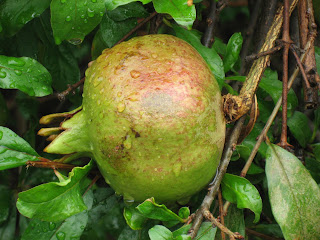
This is a picture of a Flamboyant Tree that I view from my room. I face toward the parish parking lot. On the other side of the residence is a yard and garden. I haven't done much exploring yet, but hope to do so in the next day or so.
The parish has a large complex which includes the Church, the parish offices, some staff residences and a hall. We are one of the few places that does not have a full-time security guard, but that is due to the quality of the staff that work for the chuch and the community.
I had the opportunity to say the 1730 Sunday Mass. I am very impressed with the activity of the parish. Six Masses on the weekend, four with their own choirs, one Mass in Bemba, and a children's service twice a month. And then to top it they also had two weddings and a funeral. All of the Masses are nearly packed, the music is remarkable (separate choirs) and people participate and are very active in the parish life.
Did some shopping today with one of the scholastics. We got most of the items at two large supermarkets that resemble QFC or one of the major chains in the US. We did the fruit and vegetable shopping: melons, oranges, papayas, pineapples, kiwi, cabbage, and the like. The only thing that made it different than a trip to the Broadway Market were the greens, which we picked up at a local market.
We had the first rain today, so it has cooled off a little. I am adjusting to the metric system, so the degrees get translated, the miles become meters, and even the kawache (money system) has to be converted. It is part of the challenge.
It would be difficult to imagine a warmer welcome (person in addition to heat). I really enjoy the Jesuits and I am looking forward to meeting others. I have got myself on Skype and that makes it very convenient for the telephone calls. Ten hour difference nows from Zambia to Seattle. Prayers are with you all.


 On the Feast of the Holy Family, we baptized twenty-five infants and young children and welcomed them into the Church. The pictures are of the liturgy which followed the 11:30 am liturgy. Truly a great way to end the year and to welcome the New Year. Three of us celebrated the sacrament and it was wonderful to be with the families. This was the largest group they have had at St. Ignatius. The families are well prepared by a lay leader who has the responsibility for this ministry. These new folks join the twenty adults who professed their faith on Christmas Eve.
On the Feast of the Holy Family, we baptized twenty-five infants and young children and welcomed them into the Church. The pictures are of the liturgy which followed the 11:30 am liturgy. Truly a great way to end the year and to welcome the New Year. Three of us celebrated the sacrament and it was wonderful to be with the families. This was the largest group they have had at St. Ignatius. The families are well prepared by a lay leader who has the responsibility for this ministry. These new folks join the twenty adults who professed their faith on Christmas Eve. 
+of+Nativity.jpg)















































